

To help you choose your shrubs depending on their blooming season, Nature-and-Garden recommends this selection of the most beautiful flowering shrubs for each season. It’s the best way to have a flowered garden all year round…
Whether for a hedge or for a shrub bed, one good piece of advice to heed is to choose different blooming seasons for each of your shrubs, to keep your garden alive all year round.
You’ll love admiring those flowers from the end of winter up to the first frost spells.
The most magnificent winter blooming shrubs include, for the three winter months of December, January, and February:
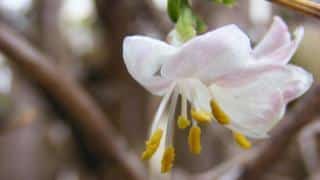 Winter honeysuckle – ever-so fragrant, this bloomer is among the first winter shrubs to bloom. It often opens up just before snow falls! Part vine and part shrub, in time this grows thick enough to stand on its own if you prune it carefully. The winter-blooming species is Lonicera fragrantissima.
Winter honeysuckle – ever-so fragrant, this bloomer is among the first winter shrubs to bloom. It often opens up just before snow falls! Part vine and part shrub, in time this grows thick enough to stand on its own if you prune it carefully. The winter-blooming species is Lonicera fragrantissima.
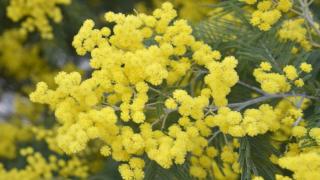 Yellow mimosa – fragrance for this one is lighter, but when you stroll right under it in full bloom, it’s scent is very definite. Sleet and ice won’t dull the flowers at all.
Yellow mimosa – fragrance for this one is lighter, but when you stroll right under it in full bloom, it’s scent is very definite. Sleet and ice won’t dull the flowers at all.And there are many more, too:
Spring is when a great many shrubs and trees wake from their slumber. In March, April and May, you’ll surely see these marvels in full bloom:
 Forsythia – Long sprigs lined thick with yellow blooms? Forsythia! Definitely a powerful reminder that Winter is over and Spring is finally here! Easy to care for, excellent for hedges that are so bright your neighbors will thank you for lighting up the streets!
Forsythia – Long sprigs lined thick with yellow blooms? Forsythia! Definitely a powerful reminder that Winter is over and Spring is finally here! Easy to care for, excellent for hedges that are so bright your neighbors will thank you for lighting up the streets!
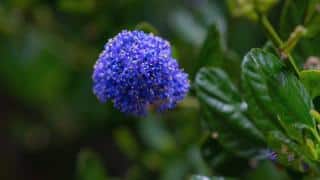 Soap bush – After yellow, the bright violet blue of the soap bush shrub will clamor for attention in the garden. Excellent grower, easy to care for. Thumb-size clusters of flowers that almost cover the entire bush.
Soap bush – After yellow, the bright violet blue of the soap bush shrub will clamor for attention in the garden. Excellent grower, easy to care for. Thumb-size clusters of flowers that almost cover the entire bush.That was just an inkling of what blooms between winter and summer, check out our more extensive list!
Typically, summer is when most of us have time to go around and savor the great outdoors. Plant these to have blooming shrubs in June, July and August!
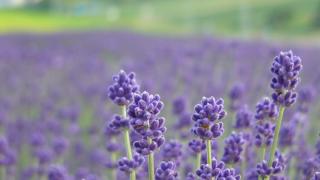 Lavender – Countless varieties and species of this heavenly-scented flower explain why it’s a definite summer favorite in Europe. Non-invasive varieties like lavandin are perfect for the Americas and other other continents. But in the Old World, war still rages…
Lavender – Countless varieties and species of this heavenly-scented flower explain why it’s a definite summer favorite in Europe. Non-invasive varieties like lavandin are perfect for the Americas and other other continents. But in the Old World, war still rages…
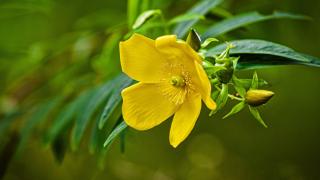 St Johns wort – Just because “wort” sounds like “wart” doesn’t mean this is an ugly shrub… quite the contrary! Yellow flowers stand out in the deep emerald-green foliage. Simple to care for, Hypericum grows to a reasonable height for a free-style hedge.
St Johns wort – Just because “wort” sounds like “wart” doesn’t mean this is an ugly shrub… quite the contrary! Yellow flowers stand out in the deep emerald-green foliage. Simple to care for, Hypericum grows to a reasonable height for a free-style hedge.
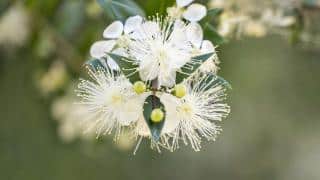 Myrtle – This pearly-white bloomer is a favorite in difficult settings. Sandy soil, poor terrain, dry at times? This can take it all! White blooms form from June and keep appearing late into early fall (October). Dwarf varieties exist.
Myrtle – This pearly-white bloomer is a favorite in difficult settings. Sandy soil, poor terrain, dry at times? This can take it all! White blooms form from June and keep appearing late into early fall (October). Dwarf varieties exist.Again, dozens of shrubs also flower in summer in addition to the three mentioned above:
These seem to have lost their marbles somewhat… blooming in Fall? Right before the winter strikes? Yes-sir-ee! And very good add it, might we add. Get your September, October and November blooms with these:
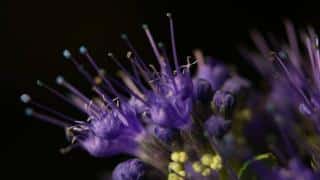 Caryopteris – But you probably know this as Bluebeard! Sounds like a pirate’s name, and in a way it is…These hectic-looking blooms haven’t seen a comb in years. Their nectar and pollen, however, definitely will: honeycombs is where they end up thanks to the work of our pollinator friends.
Caryopteris – But you probably know this as Bluebeard! Sounds like a pirate’s name, and in a way it is…These hectic-looking blooms haven’t seen a comb in years. Their nectar and pollen, however, definitely will: honeycombs is where they end up thanks to the work of our pollinator friends.
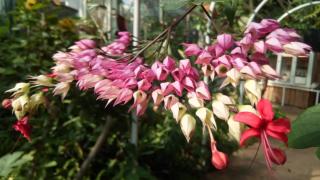 Clerodendron – (or Clerodendrum) This shrub’s flowers start out like little diamonds and then open up like delicate jasmine. Excellent for growing in containers and pots, and it only needs a little protection from the cold in harsh winters.
Clerodendron – (or Clerodendrum) This shrub’s flowers start out like little diamonds and then open up like delicate jasmine. Excellent for growing in containers and pots, and it only needs a little protection from the cold in harsh winters.More shrubs than these also will gift you flowers in Autumn:
To support your garden’s ecosystem, diversify your varieties, because each has different characteristics and this is important to ensure biodiversity. This is particularly important to pollinators if you want to save the bees, butterflies and other insects.
Sometimes after the Spring frenzy, they undergo a time of hardship even though the weather is warm. It’s called the “June pit” when insect colonies are in full swing but not many shrubs or flowers bloom. Planting summer and fall-blooming shrubs helps them meet their needs.
In winter, too, flowers are important. On warmer days, when bees leave the hive to evacuate their droppings, they also seize the chance to collect any pollen and nectar they can get hold of.
Read also on shrubs:
Remember that mixed hedging is ideal for biodiversity, beneficial animals, and plant health… and as you’ve read here, such shrubs even give you flowers all year round!